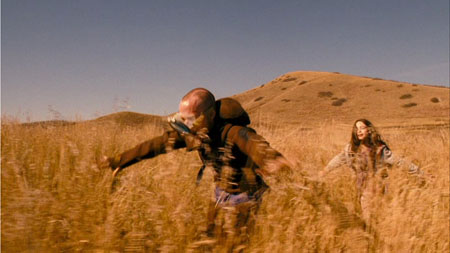
DIRECTED BY: Terry Gilliam
FEATURING: Jeff Bridges, Robin Williams, Mercedes Ruehl, Amanda Plummer
PLOT: A guilt-ridden ex-shock jock discovers he has a tragic connection to a homeless man who believes himself to be a knight questing for the Holy Grail.

WHY IT WON’T MAKE THE LIST: It’s not weird enough, although it has a couple of transcendent moments of magical Arthurian fantasy. As weird titan Terry Gilliam’s most popular and commercial (non-Python) film, it is an important touchstone in weird movie history, however.
COMMENTS: Terry Gilliam’s The Fisher King starts out strong, as a karmic drama about creep disc jockey Jack hoist on his own petard of media cynicism. When Robin Williams appears as the junkyard knight Parry, attacking a pair of punks with a garbage can lid and the power of song, it briefly becomes a wacky comedy; then develops into a redemption fable as the relationship between Jack and Parry deepens. Magical realism appears in Parry’s Arthurian hallucinations of fiery knights riding through the streets of New York. These multiple tones actually mesh surprisingly well, until the tale goes errant into the Realms of Rom-com, from whence no sane plot emerges unscathed. It concludes with a happy ending that feels very un-Gilliam; the story requires a happy ending, but this one is too pat, too Hollywood. Maybe it’s all over the map, or maybe The Fisher King just has something for everyone; high drama and mythological touchstones for the art house crowd, comedy and sentimentality for the masses.
Plot and style aside, The Fisher King is an actor’s showcase, anchored not by headliner Robin Williams, but by the excellent Jeff Bridges as a self-centered Jack (a character who inevitably evokes Howard Stern). Bridges is slick and unlovable, admired by the public only for his outrageous cruelty. But because he suffers, and because his guilt is enormous and comes from a core that has not yet been drowned in the oily cynicism that engulfs the rest of the character, we root for him to reform. Williams, of course, is the Fool. Under Gilliam’s direction, he’s restrained so that his berserk improvisatory tendencies never overshadow the story and turn it into a Robin Williams vehicle. The comic still gets plenty of moments, both manic (a nude moonlight dance in Central Park) and mawkish (his romantic stoop speech to Lydia, in which he essentially confesses to being a stalker). Mercedes Ruehl is wonderful as Jack’s long-suffering girlfriend, a typical New York Jewish/Italian mutt in trampy miniskirts. This character, who has attached herself to a down-and-out ex-celebrity, could easily have come across as needy and pathetic, but instead she is strong, sexy and noble. She justifiably won an Academy Award for Best Supporting Actress. Of the four major characters, only Plummer disappoints, slightly, and that can be blamed on the screenplay rather than her thesping. Her super-quirky, clumsy love interest role is simply unnecessary, a distraction from the film’s important relationships between Bridges and Williams and Bridges and Ruehl.
Standout moments include the Red Knight rampaging through Central Park, a massive waltz in Grand Central Station, and Tom Waits in a cameo as a “moral traffic light.” Curiously, one of the stylistic inspirations for the film is the Hollywood musical. Williams breaks into show tunes throughout, a fellow homeless man dresses up like Gypsy Rose Lee and does an Ethel Merman song-and-dance number, and the words “the end” even appear in the sky above Manhattan lit up like a Broadway marquee. Though not a musical, that spirit of light fantasy bubbles through the movie, leavening some of the themes of mass murder, alcoholic despondency, and homelessness. Even though The Fisher King has a strong sense of purpose, stylistically it’s more than a bit shaggy around the edges. Perhaps that’s appropriate in a film featuring a madman, and perhaps that makes it more lovable in the end.
WHAT THE CRITICS SAY:

